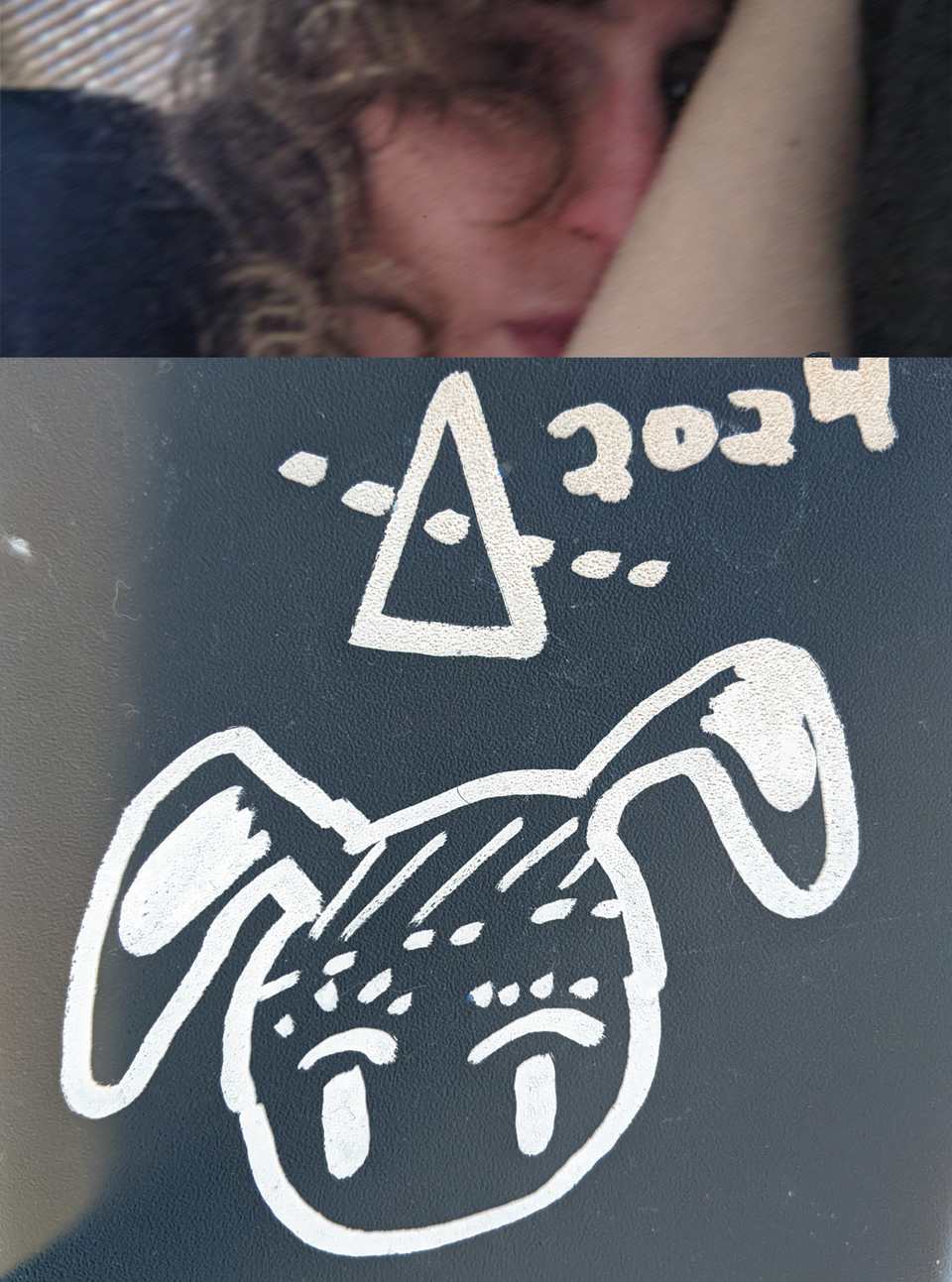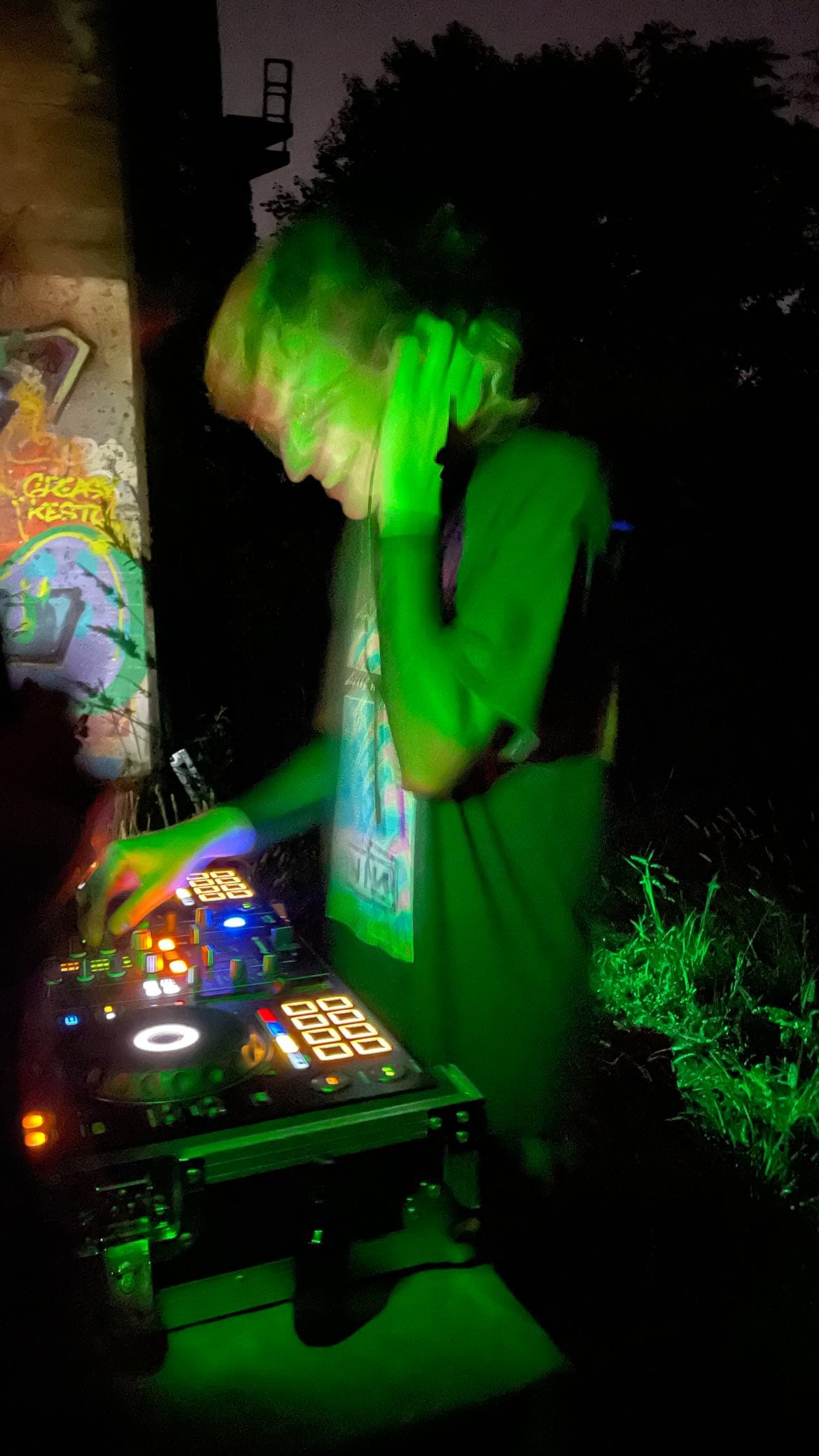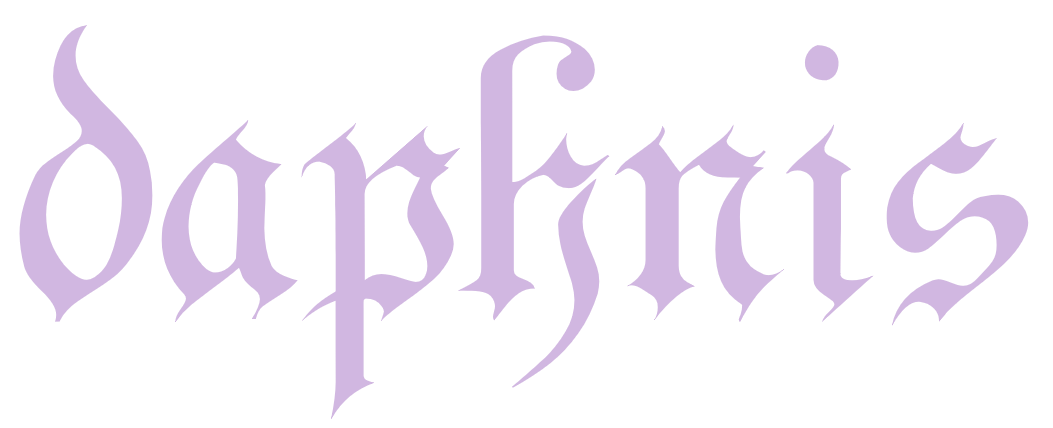Girlprince of Nothing

My friend, lover and collaborator Sam died a few months ago. The day they died was also my birthday. It's hard to talk about it. There's a lot of things I can say, and only some of them get at the core of who they were to me. I wrote this in the present tense at first because I still haven't fully accepted that they are gone.
I keep wanting to text them. When I went to their memorial, I found myself making mental plans to see them. I was going to see them, just not in the usual way. I ran into my friend Rio at their memorial and he said "it feels real now" as we stood in the room where I used to hang out with Sam and their partner Dave. I showed Rio my favorite pieces of Sam's unapologetically horny and dark cross-medium art that was on display. I felt the same as Rio. Being there together, it felt real in a new way.
Sam was one of the few people who understand certain aspects of how my mind and soul operate. I'll leave "understand" in the present tense. I'm very lucky that there are many people I've had the chance to love who have known me intimately. As with any deeper relationship, Sam knew me in a way that was unique to them.
They treated me like a princess while also holding me accountable and supporting me as I grew as a person. This is a feat few have been able to pull off. We helped each other mutually over the time we had together and our relationship was both casual and deep. Sam helped me find the courage in myself to make multiple large life decisions and the strength to assert my worth. They loved me.
I am devastated that they are gone. I know this feeling will change. For now, it feels like something is terribly wrong in the world. One of my favorite people, one of my favorite artists, is gone. I can live with this. I just wish they were here.
⌑ ⌢ ⌣ In this issue:
- Yearning Club - The first rule of Yearning Club is I don't even know the fucking rules of Yearning Club.
- Damaged City Fest 2014 - Ten years ago I wrote about going to a hardcore punk fest D.C.

Yearning Club
I'm in a small collective of Richmond trans DJs called Yearning Club. We're working on booking a show coming up. Yearning is such a trope in queer culture at this point that I guess we decided to take it to the next level and make a social organization dedicated to its study.
At first I was resistant to being a member of Yearning Club. I try to give myself the things I yearn for, and if I can't experience them, I let it go. This is part of my Buddhist practice. The style of yearning that I bring to the group is yearning for something that doesn't exist. It's a kind of surreal faith.
I yearn for something that is not of this earth. Maybe it could be, but it isn't yet here in material form. I don't even know if I want it to be realized. It may be hidden somewhere I haven't yet found, or returning after eons of absence.
I might catch a glimpse of it walking at night through a partially-cut-down forest just outside town. I cross through a construction site and crouch through a hole in the fence around the wooded area's perimeter.
A single red light is in the sky. It's a star dedicated to a transgender saint who presides over the forest. They are a saint of horniness and sadness whose pale light bathes the forest floor and my skin. The starlight flickers across a key that's partially buried in moss at the base of a tree. It glistens as I pick it up.
I take it to your tomb. I know where to go.
I miss you.
Day One at Damaged City Fest 2014
In the distant past, Ian McKaye was baptized at St Stephens, where hundreds of hardcore fans gathered to worship the hardcore punk of 2014, decades after hardcore's birth in Washinton, DC.
Damaged City fest was focused on straight-up hardcore that year. The lineup, while less diverse than previous years, provided a cross section of historical and contemporary fast, heavy, and sometimes political music.
After the first band, which I missed and did not catch the name of, Mark Anderson from Positive Force spoke to the crowd. He outlined the revolutionary history of St Stephens Church, touting the church’s extremely progressive stances against racism, homophobia, and other attacks on marginalized people of the last 50 years. Mark described St Stephens as “a church that overthrows.”
Frank Dunn – the church’s priest – came onstage afterwards, wearing 90's-style skinny acid-wash jeans and a casual black parishioner's shirt. He gave a brief sermon, telling the audience "You're the parish here. We exist for you." Dunn expressed some confusion about alternative lifestyles: tattoos, piercings, and the music. Still, he seemed to get the overall gist of punk. He closed his speech by stating that "Christianity isn't about what you believe. It's about how you live."
These statements totaled up to what seemed to me like a challenge: Why does hardcore exist? Why do you choose to devote your lives to hardcore? You could have a steady job, a stable life, and worship Jesus. What does fast, hard music have to offer you that the church doesn't?
GREEN BERET
Green Beret was incredibly hard-hitting. I caught sight of an actual bouncer on stage during their set who was wearing a classic black shirt with "SECURITY" in white on it. The band spewed breakdowns at a fly-by pace driven by drums played with incredible violence. Green Beret's lanky lead singer stalked back and forth across the stage. Guitars, while heavy, served more as a support for maniacal percussive pounding. "We're gonna fucking pander to you people," the lead singer said before the band ripped into a cover which I did not recognize. Apparently, the fans did.
VIOLENT REACTION
Following the Beret was a 4-piece with a more upbeat style. Violent Reaction consisted of dudes with short hair. A solo with three discernible notes was played, and it worked. The instruments were focused on playing fast, catchy riffs, with an extra guitar adding depth.
Between sets I saw some old faces from DC days past. There were a lot of people from out of town. One old head said in passing conversation, "Last time I was here was like, Jawbox in 1993." A tall German guy in a Minutemen shirt passed by. He said that his last time at St Stephens was 22 years prior.
RIVAL MOB
The bassist wore a cardigan. Luckily, Rival Mob had longhairs in the lineup. That was a plus. The set opened with the lead singer saying "DC. A city of political agendas. We're Rival Mob, and here's our fucking political agenda" before holding the microphone up to a silent band. He had the moves of a professional wrestler, flailing his arms as if he were drowning and swiping away imagined foes.
It was very entertaining. Many young men were mouthing the lyrics, as if it was an automatic reaction. Maybe it was.
Rival Mob's lead singer asked the crowd: "Is Rival Mob still a relevant band?" Rival Mob received no particular answer, but it provided quality low- class banter and a tight, classic sound. That’s about as close to relevance as many hardcore bands get.
GOVERNMENT ISSUE
The best outfits of the night went to GOVERNMENT ISSUE, the self-proclaimed dinosaurs of punk rock. John Stabb wore an oversized button-down shirt with a bleeding eye symbol painted on it. The gnarly guitar swirled around, with the melody held primarily by busted-sounding basslines. The guitar player wore a somewhat gaudy vertical-striped button-down shirt and played with sloppy perversity. A band mate asked the guitarist, "How do you sound so crazy?" and he said, "I just take old Rolling Stones chords, and you know, speed 'em up."
GI captured an imagination and freedom that's present in the recordings from the 80's. John Stabb made little attempt to make the songs relevant to the audience in 2014, mainly sticking to contextualizing it with anecdotes from his memories. The performance landed closer to tormented and amused art-punk in its delivery than hardcore.
Audience reaction was minimal, but for a band that prides itself on alienation, I'm not sure it mattered. A 5-second version of "Stepping Stone," a classic DC cover popularized by Minor Threat, really pleased the crowd for 5 seconds. It was pleasing to me to see such interrupted pleasure.
GI is a group of grown men who enjoy torturing each other and the crowd. Even the security dude was smiling and pumping his fist gingerly.
LOS CRUDOS
Los Crudos, a hardcore band from Chicago who came up during the 90's, played short songs sporting the most primal screams of the night. Their songs were paced well, building up to true pulverization. The band's lead singer, Martin Sorrondeguy, has a way of addressing the crowd as if he were speaking directly to you. He was wearing a GAS RAG shirt and did kick-jumps across the stage. His nimble stage moves accompanied a set that challenged the audience instead of looking only backwards in time.
Martin used stories about the time and place each song was written to let the audience in on the band's original context. Many of the bands at Damaged City owed much in their style and delivery to Los Crudos. Martin called out the audience for our racial division, noting that "all the Spanish people are up front." He invited everyone to join at the front, saying “We ain't separatist.” When he spoke to the audience directly in Spanish, it felt powerful. The pit started up.
Seeing Los Crudos explicitly addressing issues facing Latinx communities at St Stephens, where I'd primarily seen white and English-speaking bands play, was awesome. The D.C. punk scene often isolates itself in a shell of privileged whiteness that excludes BIPOC punks. Crudos challenged the social codes within punk that, when unquestioned, dictate what punk can be by talking directly about racism and inequality in their songs and their stage banter.
Towards the end of their set, Martin directly asked the women in the audience to come up. They rushed the stage for Los Crudos' iconic anthem "We're That Spic Band." At the time I didn't identify as a woman, but were I there now, I totally would have joined them.
A friend pointed out after the fest that most reporters for major publications would be out reviewing an indie band in a mostly-empty bar instead of bothering with Damaged City. Hardcore is deceptively simple. Its simplicity is misleading to those who overlook its most valuable currency: challenging ideas paired with fast brutality.
Listen to this
I've been listening to this on loop. My astrology app called me out for listening to a track on loop. Oops.
Next time
I'm gonna write about vampire fuckboys, share the track ids for my DJ set I posted a while back, and contemplate philosophy with an AI chatboy in Artificial Platonic Catigirl Philosopher.
.JOOOEL. __.
_JF" (ee .Joi"ieL_
Fo) `4F_ OiF" (eo
OE) EEe) (EO
OE) ee (FO
Oe) (EO
EE) by daphnis (eE
FF) (eO
(ee EF)
`4Fi _FF`
OFO) eE
"FFL_ (oF"
(oEe ioFe
`"""""`
see you next time, angel
Member discussion